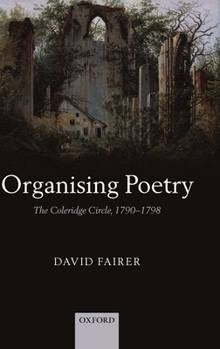Organising Poetry: The Coleridge Circle, 1790-1798
In this revisionary study of the poetry of Coleridge, Wordsworth and their friends during the 'revolutionary decade' David Fairer questions the accepted literary history of the period and the critical vocabulary we use to discuss it. The book examines why, at a time of radical upheaval when continuities of all kinds (personal, political, social, and cultural) were being challenged, this group of poets explored themes of inheritance, retrospect, revisiting, and recovery. Organising Poetry charts their struggles to find meaning not through vision and symbol but from connection and dialogue. By placing these poets in the context of an eighteenth-century 'organic' tradition, Fairer moves the emphasis away from the language of idealist 'Romantic' theory towards an empirical stress on how identities are developed and sustained through time. Locke's concept of personal identity as a continued organisation 'partaking of one common life' offered not only a model for a reformed British constitution but a way of thinking about the self, art and friendship, which these poets found valuable. The key term, therefore, is not 'unity' but 'integrity'. In this context of a need to sustain and organise diversity and give it meaning, the book offers original readings of some well known poems of the 1790s, including Wordsworth's 'Tintern Abbey' and 'The Ruined Cottage', and Coleridge's conversation poems 'The Eolian Harp', 'This Lime-Tree Bower', and 'Frost at Midnight'. Organising Poetry represents an important contribution to current critical debates about the nature of poetic creativity during this period and the need to recognise its more communal and collaborative aspects.
Format:Hardcover
Language:English
ISBN:0199296162
ISBN13:9780199296163
Release Date:August 2009
Publisher:Oxford University Press, USA
Length:360 Pages
Weight:1.65 lbs.
Dimensions:0.9" x 6.4" x 9.2"
Related Subjects
PoetryCustomer Reviews
0 rating





